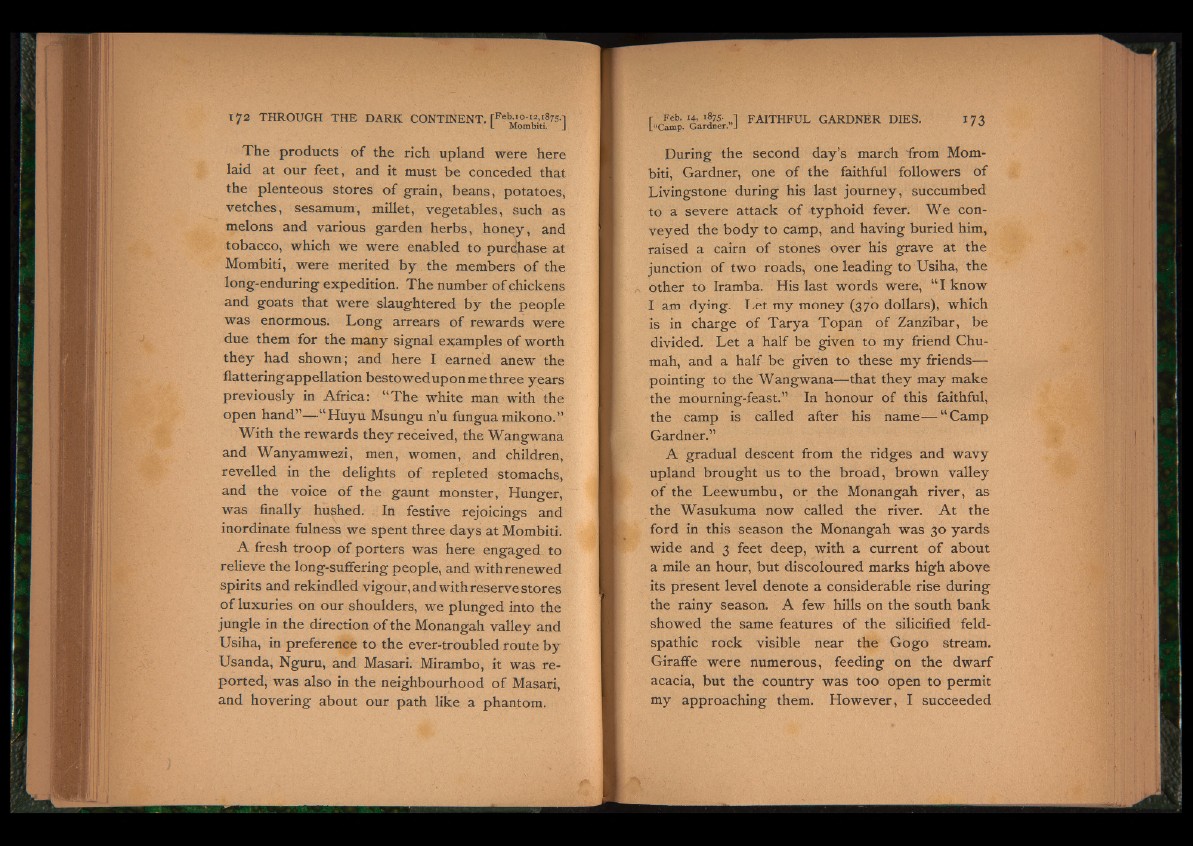
T he products o f the rich upland were here
laid at our feet, and it must be conceded that
the plenteous stores o f grain, beans, potatoes,
vetches, sesamum, millet, vegetables, such as
melons and various garden herbs, honey, and
tobacco, which we were enabled to purchase at
Mombiti, were merited b y the members o f the
long-enduring expedition. The number o f chickens
and goats that were slaughtered b y the people
was enormous. L on g arrears o f rewards were
due them for the many signal examples o f worth
th ey had shown; and here I earned anew the
flattering appellation bestowed upon me three years
previously in Africa: “ The white man with the
open hand”— “ Huyu Msungu n’u fungua mikono.”
With the rewards th ey received, the Wangwana
and Wanyamwezi, men, women, and children,
revelled in the delights o f repleted stomachs,
and the voice o f the gaunt monster, Hunger,
was finally hushed. In festive rejoicings and
inordinate fulness we spent three days at Mombiti.
A fresh troop o f porters was here engaged to
relieve the long-suffering people, and with renewed
spirits and rekindled vigour, and with reserve stores
o f luxuries on our shoulders, we plunged into the
jungle in the direction o f the Monangah v a lle y and
Usiha, in preference to the ever-troubled route b y
Usanda, Nguru, and Masari. Mirambo, it was reported,
was also in the neighbourhood o f Masari,
and hovering about our path like a phantom.
r Feb. 14, 1875. 1 FAITHFUL GARDNER DIES. 173
L“Camp. Gardner. J '
During the second day’s march from Mombiti,
Gardner, one o f the faithful followers o f
Livingstone during his last journey, succumbed
to a severe attack o f typhoid fever. W e conveyed
the b ody to camp, and having buried him,
raised a cairn o f stones over his grave at the
junction of two roads, one leading to Usiha, the
other to Iramba. His last words were, “ I know
I am dying. Let my money (370 dollars), which
is in charge o f T a ry a Topan o f Zanzibar, be
divided. Let a half be given to my friend Chu-
mah, and a half be given to these my friends—
pointing to the Wangwana— that th ey may make
the mourning-feast.” In honour o f this faithful,
the camp is called after his name— “ Camp
Gardner.”
A gradual descent from the ridges and w a vy
upland brought us to the b ro ad , brown valley
o f the Leewumbu, or the Monangah river, as
the Wasukuma now called the river. A t the
ford in this season the Monangah was 30 yards
wide and 3 feet deep, with a current o f about
a mile an hour, but discoloured marks high above
its present level denote a considerable rise during
the rainy season. A few hills on the south bank
showed the same features o f the silicified feld-
spathic rock visible near the G o go stream.
Giraffe were numerous, feeding on the dwarf
acacia, but the country was too open to permit
my approaching them. However, I succeeded